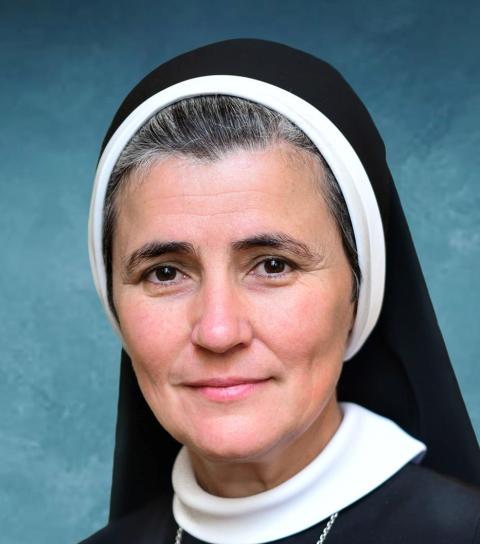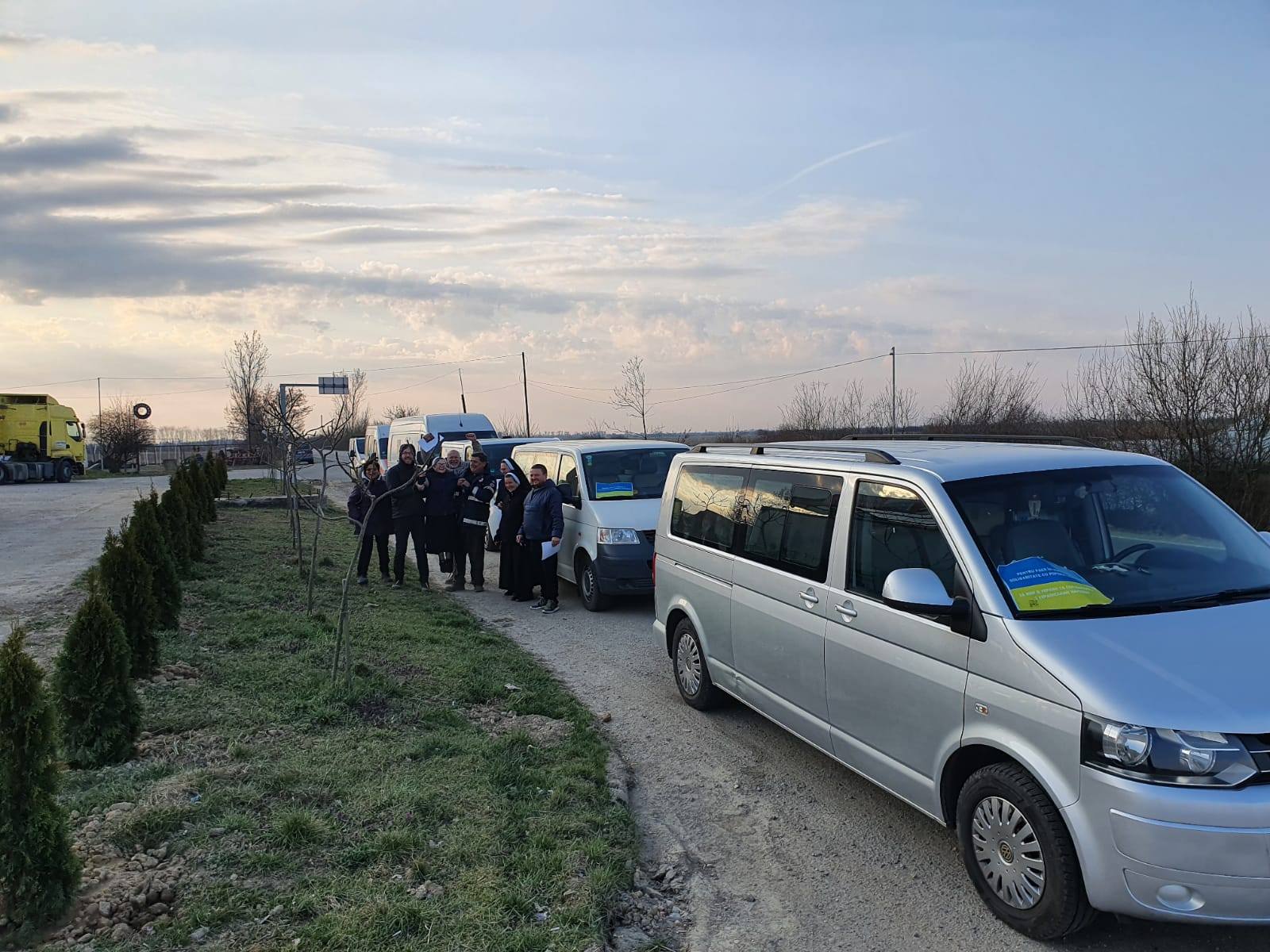
Basilian Sisters and volunteers from Romania deliver humanitarian aid to Ukraine in April 2022. (Courtesy of the Sisters of the Order of St. Basil the Great)
Editor's note: On Feb. 23, Global Sisters Report will launch a new series: Hope Amid Turmoil, a look at the lives and ministries of women religious serving in areas of conflict. The news stories, columns and Q&As in this series will include sisters in Ukraine, Nigeria, Kenya, Sri Lanka, Nicaragua and more. We look forward to sharing it with you.
Mother Marcela Runcan is general superior of the Sisters of the Order of St. Basil the Great, an international monastic order with 400 sisters in 11 countries: Ukraine, Romania, Poland, Hungary, Slovakia, Croatia, Italy, Argentina, Brazil, Australia and the United States.
The Eastern Catholic order is based on the tradition and spirituality of the Eastern Catholic churches and the writings of St. Basil the Great. All communities of Basilian Sisters around the world became one order led by a general administration in Rome in 1951.
According to their monastic rule, the way of life of the Basilian Sisters is both contemplative and apostolic. The sisters work in evangelization, education, health care and other areas.
Since Feb. 24, 2022, when Russia invaded Ukraine, the Basilian communities in Ukraine opened to care for refugees. Their sisters in the United States and Australia have been raising money and sending supplies, while sisters from Ukraine's neighboring countries transport humanitarian aid and accept refugees.
Mother Marcela was born and grew up in Romania under a communist regime that oppressed religion. She remembers that people could not speak openly about God when she was a child: The country's Greek Catholic Church was underground for 40 years between 1948 and 1989, when almost all Greek Catholic priests and bishops were imprisoned. Those who were free had to work as menial laborers.
Despite this national repression, Mother Marcela had a strong grounding in the Catholic faith. In the evenings, her family prayed the rosary, and her elder brother read an excerpt from the lives of the saints. Because they couldn't go to church on holidays, they listened to the liturgy on Vatican radio. If it was possible, on the eve of or after a holiday, a priest would come to their home or that of another family and celebrate the liturgy secretly at night with covered windows and locked doors.
She felt the call of her vocation early and said she thinks the repression in Romania made her stronger in her conviction to enter religious life.
When she was about 11, she said, the priest who taught her catechism asked her: "Do you want to become a sister?"
"I always wanted that," she replied.
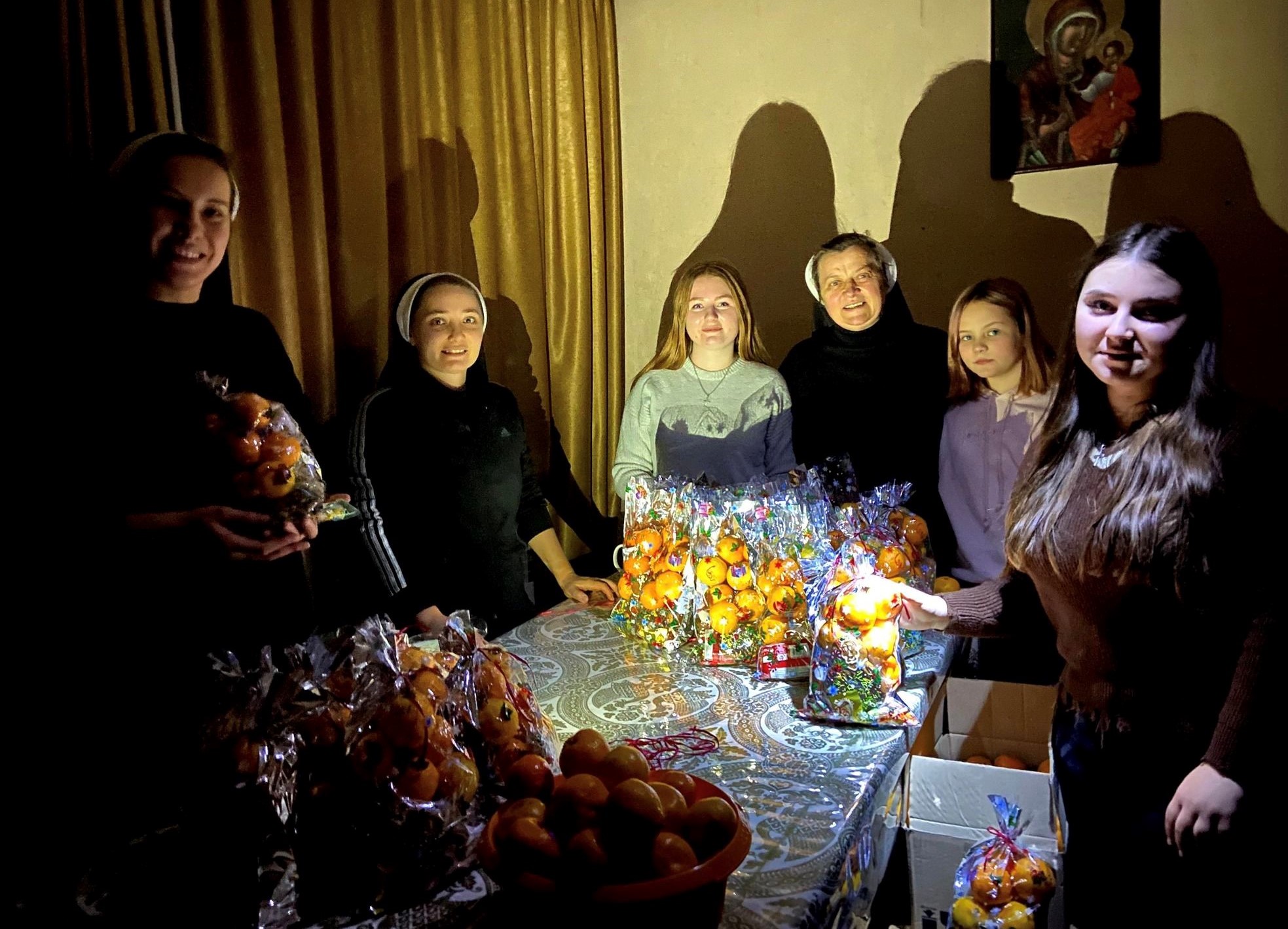
Basilian Sisters and young people prepare for St. Nicholas Day during a blackout in eastern Ukraine on Dec. 19, 2022, the feast of St. Nicholas in the Julian calendar, which Ukraine follows. (Courtesy of the Sisters of the Order of St. Basil the Great)
At age 13, she met the Basilian Sisters, knowing only that they prayed a lot. She began to go with them on pilgrimages and to monthly meetings in cities where the sisters lived. There was no high school in her village, so to avoid commuting every day and with the consent of her parents, she lived with friends who were Basilian Sisters in their apartment in Nasaud. In 1985, at 15, she entered the secret novitiate.
To protect her parents, she could not share that she had entered the novitiate. She later told her mother, who had always supported her prayer journey, about making first vows, but her father did not know until after Romania was freed in 1989 and he saw her wearing the congregation's habit.
After finishing school, Mother Marcela worked in various ministries, mostly with children and young people. She was the provincial superior of the Basilian Sisters in Romania from 2002 to 2007 and again from 2017 to 2019, when she was elected general superior of the order. She is now based in Rome.
Global Sisters Report interviewed Mother Marcela through email about the ongoing war in Ukraine, where 156 Basilian Sisters still live, and how sisters around the world are providing support and assistance.
GSR: It's been a year since Russia invaded Ukraine. How has the war affected and changed your order and communities?
Mother Marcela: A full-scale war brings enormous destruction every day. The sisters in Ukraine felt the burden of the missile attacks, staying with people in the shelters, experiencing uncertainty and threats to life.
From the first days, when the streams of refugees, especially mothers and children, rushed to the western part of Ukraine looking for a shelter or to go abroad, the Basilian Sisters as well as other monastic congregations and numerous volunteers did everything possible to help relieve suffering and save lives.
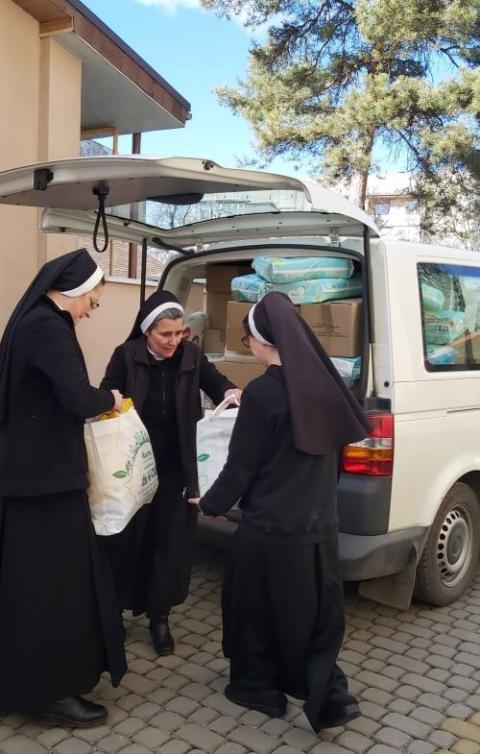
Mother Marcela Runcan, center, and sisters from Romania deliver humanitarian aid to Mukachevo, Ukraine, on March 8, 2022. (Courtesy of the Sisters of the Order of St. Basil the Great)
Of course, the most vulnerable groups needed special help: children, pregnant women, the wounded, the chronically ill who depended on medical care, lonely elderly people. While helping the needy, the sisters in Ukraine were trying to continue their ministries, such as schools and catechism classes.
During these days, the value of the internationality of the order was particularly evident. A special blessing for us was the meeting of our major superiors in Slovakia in August, where we had the opportunity to experience our unity in diversity, to pray together and together discern God's will for our future — in particular, how to serve the suffering people of Ukraine.
How have your sisters in Ukraine helped during the war?
Our sisters in Ukraine decided to remain side by side with people, to be close, to serve and to support.
The Basilian Sisters in the western, central, and eastern parts of Ukraine are helping mothers with children, the elderly, and the seriously ill people to escape dangerous places. They also transport humanitarian aid and cooperate with volunteers from different countries.
Families from Mariupol, Sloviansk, Kramatorsk, Zaporizhzhia, Kyiv, Zhytomyr have found refuge in our monasteries of the western part of Ukraine. The Basilian Sisters in eastern Ukraine went through the most difficult months. They prayed the liturgy in the subway and visited soldiers, civilians and forcibly displaced persons, bringing them comfort, food and medicine. After the liberation of the Kyiv region, the sisters began to visit the most affected places like Irpin and Bucha, villages of Chernihiv region.
How have sisters in provinces far away helped?
From the beginning, the Basilian Sisters in all the countries where we are based have been involved in the active work of helping Ukraine and the refugees who have arrived in their countries.
Sisters from the United States do a great job of collecting and sending humanitarian and financial aid, supporting newly arrived refugees from Ukraine, and helping them integrate into new circumstances. The sisters from Romania, which borders Ukraine, helped from the first days with humanitarian aid. Sisters in Croatia and Poland accepted refugees in their monasteries. According to estimates, hundreds of refugees passed through the Basilian Sisters' monasteries in Ukraine and the world who found temporary shelter or stayed here for a long time.
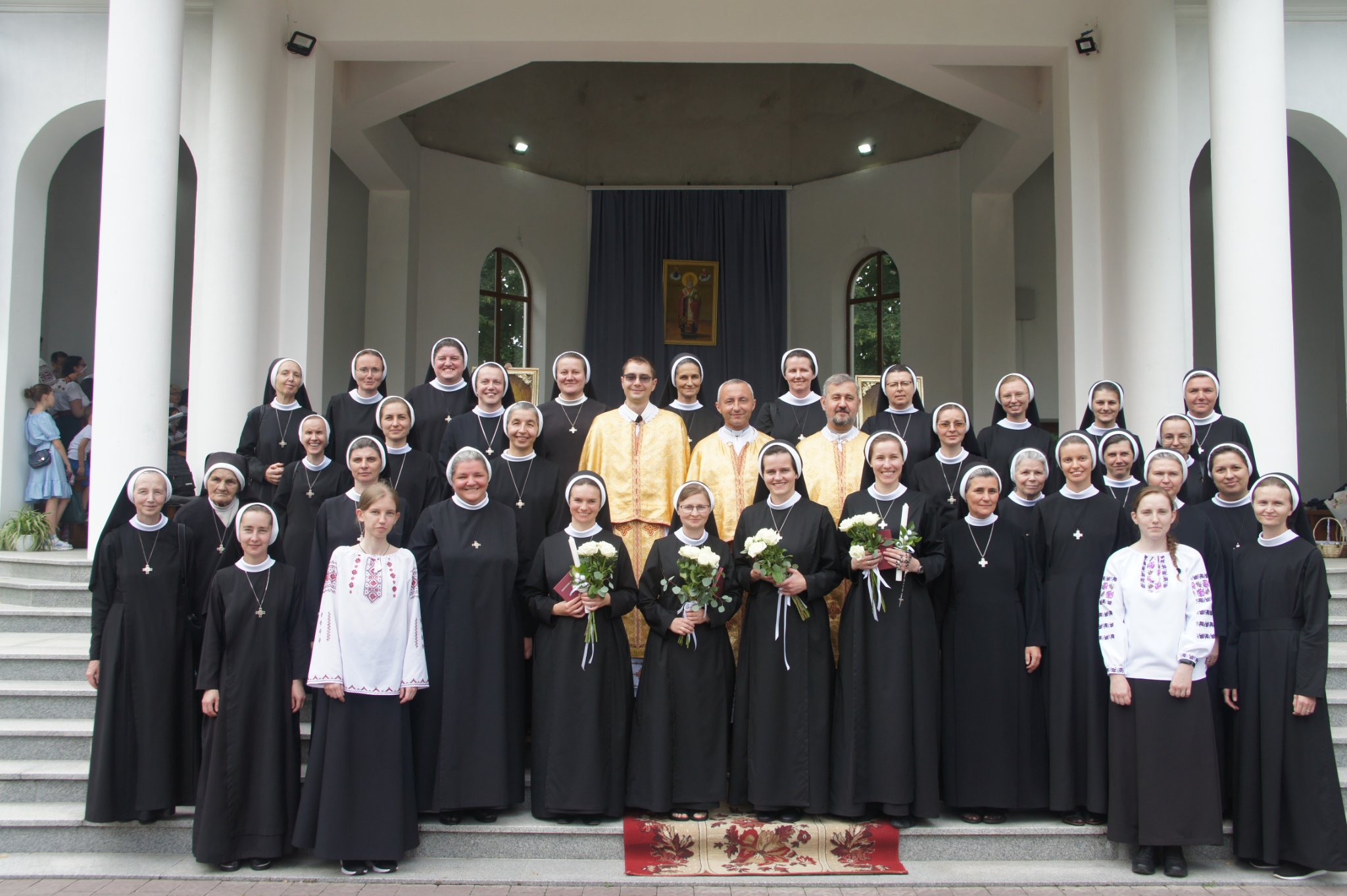
Basilian Sisters and others pose after four Basilian Sisters took their perpetual vows on July 24, 2022, in Ukraine. (Courtesy of the Sisters of the Order of St. Basil the Great)
Sr. Veronika Galatan worked as a Red Cross volunteer in Croatia, providing psychological and spiritual assistance to refugees from Ukraine. And of course, the Basilian Sisters all over the world, from Argentina to Slovakia, from Hungary to Brazil, pray zealously and tirelessly with many other men and women of prayer, creating a prayer shield over all who are in danger. We pray that the Lord will help to end this war.
Have you visited Ukraine since the war began? How do you keep up the spirits of your sisters in Ukraine?
The start of the war in Ukraine found me in Romania, where I was conducting a canonical visitation. Like everyone else, I was concerned and followed the events that were progressing rapidly, in particular because 40 percent of the sisters of our Order of St. Basil the Great and their families are situated in Ukraine.
First of all, we contacted our sisters in Ukraine, asked them what they needed and sent the first humanitarian aid. On March 8, I managed to visit Ukraine — our monastery in Mukachevo, a city on the western border of Ukraine — together with the sisters from Romania, when we brought food, medicine and other things needed. Since then, this flow of humanitarian aid has not stopped.
It is important for us to help the sisters, the people they cared for, but above all, to be there, expressing our closeness and emotional support. On that day, I felt how much my presence among the sisters in Ukraine meant to them. I visited Ukraine for the second time in July to celebrate the perpetual vows of four Basilian Sisters. At that time, the initial fear and confusion in the society had been replaced by endurance and a determined willingness to work long-term for victory.
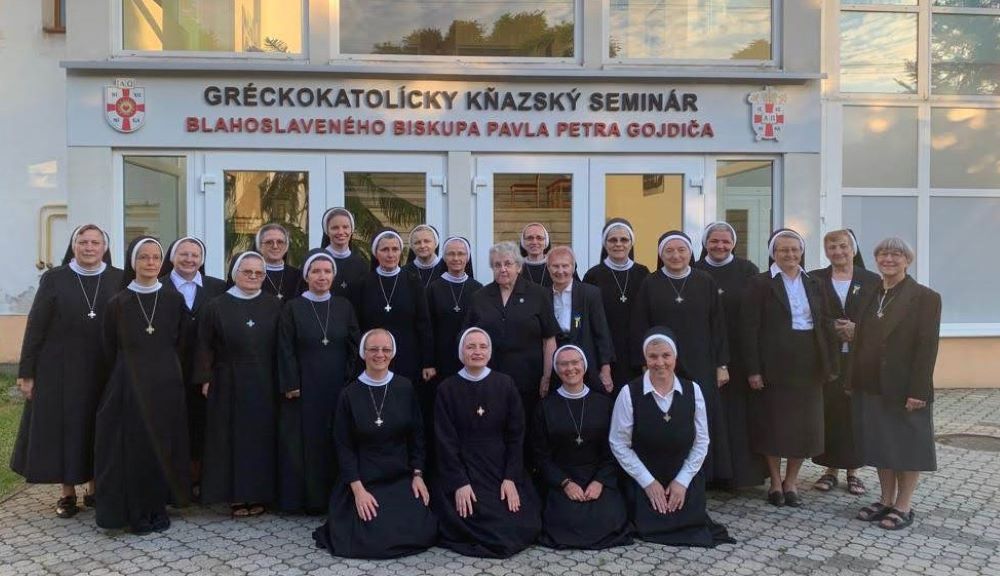
The Council of the Basilian Sisters meets in August 2022 in Preshov, Slovakia. (Courtesy of the Sisters of the Order of St. Basil the Great)
What has been the biggest challenge or worry you've faced in your leadership during this time?
The biggest challenge for me was to discern how to help the sisters, how to be close to them. The first step was prayer, in which I asked God's light about how to act. On one hand, it was important for me to maintain close, personal contact with sisters in Ukraine; on the other hand, I wanted to support the desire of sisters from other countries to help. It was important to respond to the challenge of full-scale war and at the same time to remain who we are: consecrated women and, above all, humans.
Some sisters — indeed, many Ukrainians — say they were surprised Russia invaded. Were you surprised?
From my conversation with the sisters in Ukraine, I cannot say they were surprised by the very fact of the invasion. The sisters know the history of Ukraine very well, and they are aware of the threat Ukraine has faced from Russia during the last three centuries, including the Holodomor (the Russia-instigated famine of 1932-33), the destruction and persecutions of Ukrainian intellectuals and the church as well as the invasion in eastern Ukraine that started in 2014.
A shock for the sisters and for me was a full-scale war: an absurd and cruel bombing of cities of millions of citizens, hospitals, schools, kindergartens; torture; devastation; and the open denial of the right to exist to Ukrainians as a people.
I lived communism without choosing it. War is imposed, as well. Both communism and war are two things we do not choose; they are imposed. In the 21st century, we could avoid them.
Advertisement
How do you keep up your spiritual strength in this difficult time? Have you or the congregation changed or deepened any of your prayer practices since the war began?
As an order, we became more united in mutual help and prayer. On Feb. 12, 2022, on the eve of the full-scale invasion, we held an online meeting of all the sisters where we prayed together for peace and expressed our support to the sisters in Ukraine, and they, in turn, shared with us their inner calm and testimony of courage. Since then, at our regular Zoom meetings of the sisters of our order, we devote some time for prayer for Ukraine and for listening to the testimonies of our Ukrainian sisters. Also, each province/community prays for our sisters in Ukraine and for peace. Our prayer for peace has not waned in our monasteries throughout the world.
I think that on a personal level, each of our sisters experienced this year as a time of spiritual growth. We are also impressed by the numerous testimonies of God's action in the lives of our sisters and all the Ukrainians during this year. All this gives us hope for victory and Resurrection.

